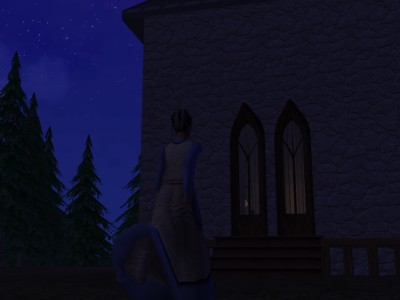
Gunnilda went running up the hill to the chapel, sorry she hadn’t taken a cloak to wear over her head against the rain.
It certainly wasn’t much to look at, she thought as she approached the door. Boards still covered the places where the windows would go, and there were wooden stairs in place of stone, and the earth all around was all covered with bits of stone and scraps of wood. “Where it’s not covered with mud, that is,” she said to herself as she nearly slipped.
She scraped her feet on the edge of the steps before letting herself in. For all it had the look of a work in progress, there was no doubt this was a church – she felt it as soon as she stepped inside. The roof soared higher than candlelight could reach, and who could say but that heaven hovered just above? and the very air seemed holy.

She crossed herself and padded quietly up the aisle to where His Grace the Duke sat alone, his head bent – over a book, she found as she approached him. She stood quietly, allowing him to finish his prayer, or whatever it was he read.
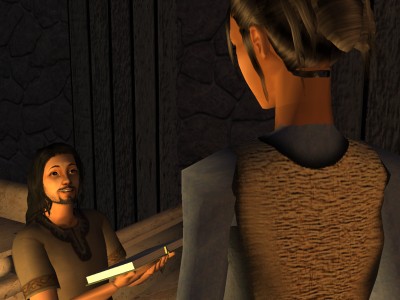
Soon he crossed himself and stood, smiling at her – a brave smile, she thought, to hide his fears.
“Been reading the Bible?” she asked.
“I suppose I’ve been mixing the sacred and the profane this night,” he laughed nervously.
“The profane?”
“Matilda copied the poetry I wrote when I was courting her into this Psalter. I’ve been reading a Psalm and then reading my nonsense next to it.”
“You mean love poetry?” she asked.
“I suppose I do.”

“Well, I don’t know but I guess that love is somehow sacred too. I guess there’s some love poetry in the Bible too, isn’t there? That’s what Egelric told my boy when he said that the Bible was boring reading.”
“Bertie must have been stuck in the part with all of the begats. Tell him he shouldn’t simply start at the beginning. But Egelric should get him reading the battles or something interesting for small boys. I don’t know whether he can appreciate the Song of Solomon yet. ‘Thy two breasts are like two young roes that are twins, which feed among the lilies,’” he quoted.
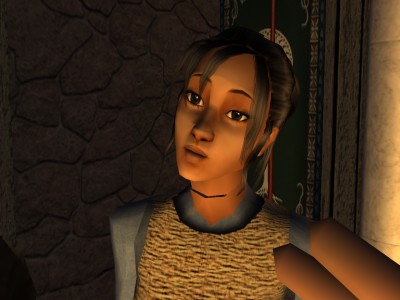
Gunnilda lifted her eyebrows. “That don’t make much sense,” she said, glancing down at her chest to see if she could spot a resemblance to deer. “Is that your poetry or Solomon’s poetry?”
“Solomon’s!” he laughed. “Mine is much worse.”

She laughed with him. “I guess men always have been fools when they love, if even the old wise ones like Solomon can write nonsense like that.”
“Gunnilda,” he said, his smile and his laughter fading, “I’ve been brave as long as I can, now tell me at once – how is she?”

“Oh, pish! Your Grace don’t think I would come up here and laugh at your poetry if Her Grace was in trouble! I come up here to tell you to come back home and see your new girl.”
“A girl!” he cried, taking Gunnilda by the arms.

“A real pretty girl, looks just like Gwynn… at two months! A real big girl, what!” She smiled to see his joy.
“A girl!” he repeated stupidly. And then he let go of her and turned to the altar and mumbled something in Latin and crossed himself – and then he grabbed her arms again and cried, “A girl! I shall name her Margaret!”
“Well, that’s a fine name!”
“And Matilda…?”

“Her Grace was sitting up and feeding her young ladyship when I come to get you. You better hurry, though, ’cause they usually like to sleep after their first feeding, and you’ll want her to get a look at your face.”
“Won’t that frighten her?” he joked.
“Oh, pish! Go on, you!”
He suddenly grabbed her and kissed her full on the mouth.

“You beautiful woman!” he cried. “You beautiful, beautiful woman! ‘Behold, thou art fair! Thou hast doves’ eyes!’” he quoted, laughing, as he ran for the door.
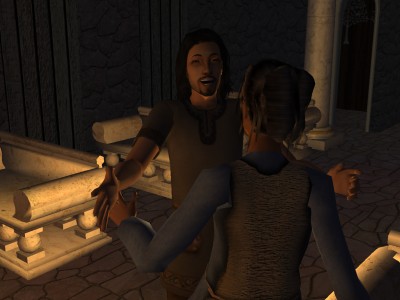
Gunnilda shook her head. “Always have been, always will be. The lucky ones, anyway.” And she blew out the candles and walked back up the aisle with a sigh.
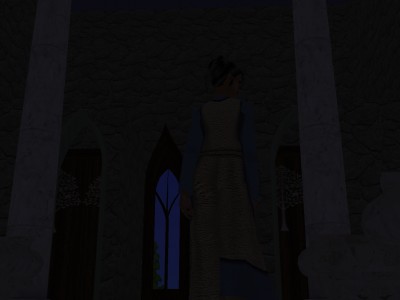






Yay, a girl! You better not be playing with us to make us think Matilda will be okay and then suddenly die...